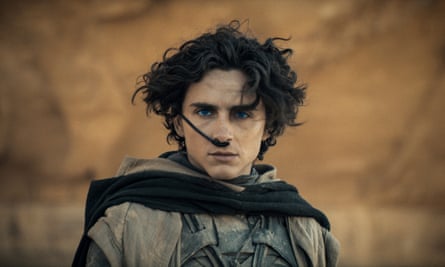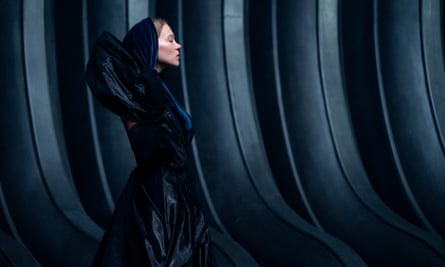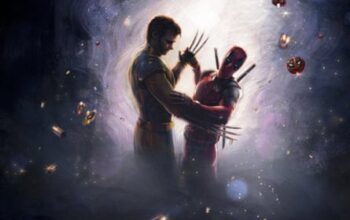T
This week, the second portion of filmmaker Denis Villeneuve’s expansive film version of the science fiction classic Dune is being released. But if the original author Frank Herbert were still alive, how would he feel about it? We delve into the aspects that the movies accurately capture about Dune and also areas where they may have veered off course.
Right – The Atreides
In the world of Dune, House Atreides holds a position of power as a colonial force. While they may be seen as more ethical compared to other noble houses under the Galactic Imperium, particularly their enemies House Harkonnen, their main goal is still self-gain. They plan to exploit the Fremen in order to solidify their own status. Right from the start, Fremen warrior Chani questions who will become their next oppressors, showing how directors Denis Villeneuve and Eric Roth do not shy away from the complexities of this moral dilemma. They do not fall into the previous pattern of portraying the Atreides as heroic figures, simplistically rescuing the Fremen from oppression.
Wrong – The Fremen
In the novel, Dune, the author Frank Herbert makes it clear that the Fremen, a group of desert warriors, are descendants of the Islamic diaspora. The story incorporates many terms from Arabic and elements of Islamic thought, religion, and culture. Director Denis Villeneuve’s film adaptation chose to remove most Arabic references and cast a diverse group of actors as the Fremen. As a result, the Fremen lost their unique cultural identity and became generic rebels. It may have been more effective to honor Herbert’s vision and consult with Islamic experts to ensure that the cultural elements were accurately represented.

Display the image in full screen mode.
Right – Arrakis
Villeneuve’s Dune is a cinematic experience that engulfs its viewers. Unlike many sci-fi movies, which span multiple planets, the entire story takes place on one world. Therefore, the world itself must feel entirely authentic. With its sweeping deserts and rugged peaks, as well as its hidden and mysterious sietches, Villeneuve’s Arrakis is a fully captivating landscape, just as intriguing and plausible as the one Frank Herbert envisioned over six decades ago.
Wrong – Arrakeen
In the books, the bustling capital city of Arrakeen is filled with a variety of people such as traders, smugglers, off-worlders, water-sellers, and religious fanatics. However, in Denis Villeneuve’s adaptation, we do not get the chance to see much of the city as it is kept off-screen. This results in the Fremen, who are depicted as a diverse group of people in Herbert’s novel, being short-changed. In the book, they range from the well-off and lazy “city Fremen” of Arrakeen to the resilient and secretive warriors of the sietches, all with their distinctive “blue in blue” eyes. In the film, the Fremen are portrayed as a homogenous group, almost faceless, and primarily living in the dusty desert.
Right – The perils facing Paul Muad’Dib
In previous film versions of Dune, Paul Atreides is portrayed as a messiah figure: the chosen prophet who arrives to liberate the Fremen from oppressive rule. However, this oversimplified interpretation was not the intention of author Frank Herbert – in fact, the most pivotal line in the Dune series may be “there could be no greater catastrophe for your people than for them to be governed by a Hero”. By fully embracing this morally complex yet crucial aspect of Herbert’s story, Villeneuve and Roth have created something far more intriguing than the traditional “hero’s journey” narrative seen in past adaptations.

Incorrect – The unfortunate event involving Doctor Yueh
Villeneuve’s portrayal of Doctor Yueh in Dune disappoints as it disregards the complexity of his character. In the books, Wellington Yueh is flawed but relatable, willing to make sacrifices in order to free his spouse from eternal suffering and seek revenge against Baron Harkonnen. However, in the films, he lacks emotional depth and his inner turmoil and love for his tortured wife, Wanna, are not adequately portrayed. This decision takes away some of the emotional impact of the story and reduces Yueh’s betrayal to a contrived plot element instead of a final act of desperation.
aristocra
The Bene Gesserit, a covert all-female “mind and body school”, play a crucial role in both Herbert’s novel and Villeneuve’s film, despite their elusive nature. The concept that the Fremen’s religious beliefs were strategically implanted by the Bene Gesserit for their own manipulative agenda is a complex one that previous adaptations have disregarded. However, Villeneuve and Roth boldly embrace Herbert’s notion that religious beliefs can be manufactured by insidious forces, giving the films a subtly revolutionary and topical edge.

Wrong – The mentats
In the Dune universe, the use of computers has been forbidden. In the aftermath of a devastating war, machines capable of thought have been replaced by mentats, humans who have been trained and exploited to perform complex calculations and predictions. However, this is not evident in Villeneuve’s film. The character of Piter De Vries, a grotesque and intriguing “twisted mentat” portrayed by Brad Dourif in the 1984 adaptation by David Lynch, is not given a name in the movie. Additionally, while the Atreides’ mentat advisor Thufir Hawat plays a significant role in the first film, he is unexpectedly absent in Part Two.
Right – The Imperium
The world of Frank Herbert’s Dune draws inspiration from various cultures throughout history, but is still remarkably unconventional. The Imperium operates on long-standing power dynamics and rigid codes of honor and behavior, tightly regulating everything from commerce and transportation to warfare, combat, and murder. With the use of mystical customs, elaborate costumes, and unique spacecraft designs, Villeneuve’s film accurately captures this otherworldly essence, allowing the seemingly straightforward and brutal life on Arrakis to feel somewhat relatable in comparison.
Wrong – The Spice
Some may consider Frank Herbert’s Dune to be mind-blowing. Despite being written two years before the “psychedelic revolution” and by an author who claimed to have never used hallucinogenic drugs, there are passages in the story that accurately portray the experience. The film adaptations, however, do not capture this sensation as well. While some of the scenes are present, they are condensed and lack the intense trippiness of Herbert’s writing. This once again neglects the Fremen people, who see the consumption of Spice as a religious practice and a way to bond within their culture. It is a captivating aspect that Villeneuve has chosen to overlook.
Source: theguardian.com


